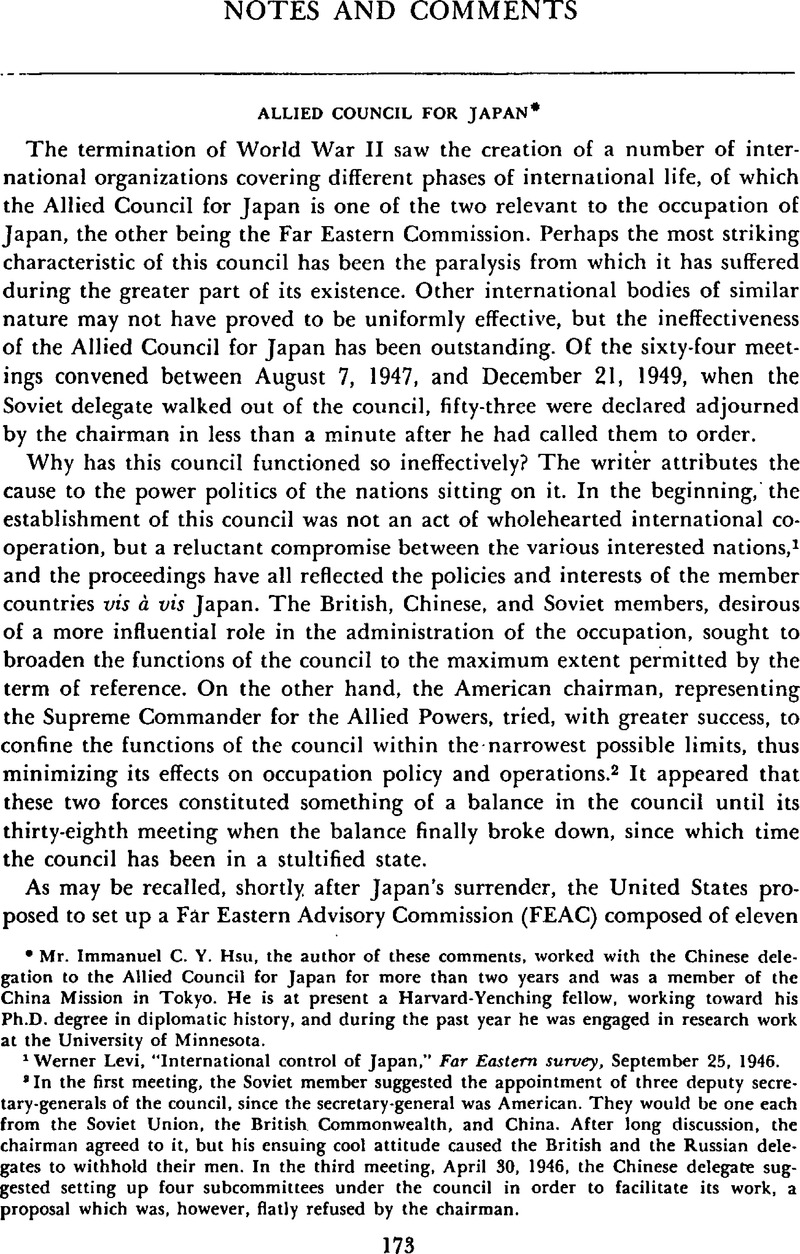No CrossRef data available.
Published online by Cambridge University Press: 23 March 2011

1 Werner Levi, “International control of Japan,” Far Eastern survey, September 25, 1946.
2 In the first meeting, the Soviet member suggested the appointment of three deputy secretary-generals of the council, since the secretary-general was American. They would be one each from the Soviet Union, the British Commonwealth, and China. After long discussion, the chairman agreed to it, but his ensuing cool attitude caused the British and the Russian delegates to withhold their men. In the third meeting, April 30, 1946, the Chinese delegate suggested setting up four subcommittees under the council in order to facilitate its work, a proposal which was, however, flatly refused by the chairman.
3 These eleven nations are: U.S., U.S.S.R., United Kingdom, China, Australia, France, Netherlands, Canada, India, New Zealand, and the Philippine Commonwealth.
4 Occupation of Japan, policy and progress (Washington, 1947), p. 7Google Scholar. State Department publication, number 2671.
5 The official title of the British member is: Member representing jointly the United Kingdom, Australia, New Zealand, and India.
6 Occupation of Japan, 72, 73.
7 Among the subjects discussed in the early meetings were: the purge, government food policy, the zaibatsu, demilitarization, repatriation, labor, public health, coal mining, general election, fisheries rights, religion, education reform, land reform, police reform, etc.
8 Of the fifty-eight subjects discussed in the entire one hundred and two meetings within the period under consideration, only eleven were proposed after the thirty-eighth meeting. Seven of them were presented by the American chairman, three by the Soviet member, and one by the British member.
9 Of the very few that have been found acceptable, the British member contributed opinions on the land reform, stabilization of wages and prices, and repatriation. The Chinese and Russian members contributed on the temporary nationalization of coal mines.
10 Verbatim minutes, thirty-eighth meeting.
11 Ibid.
12 Ibid.
13 The original heading, “Subject for discussion,” was altered to “Subject proposed for discussion,” and other agenda headings — “Scope of information desired,” “Specific information desired on progress to date,” and ”References” — were deleted.
14 Verbatim minutes, fourteenth meeting.
15 Of the forty-seven subjects placed on the council agenda before the crucial thirty-eighth meeting, twenty-five were proposed by the Soviet member.
16 Ball, W. M., Japan:enemy or ally? (New York: John Day, 1949), 23, 35.Google Scholar
17 Verbatim minutes, second meeting.
18 Ball, 31.
19 Verbatim minutes, fourth meeting.
20 Verbatim minutes, twenty-ninth meeting.
21 Letter to the Soviet Delegation, November 14, 1949, from the secretariat of the council, prepared at the direction of the chairman.